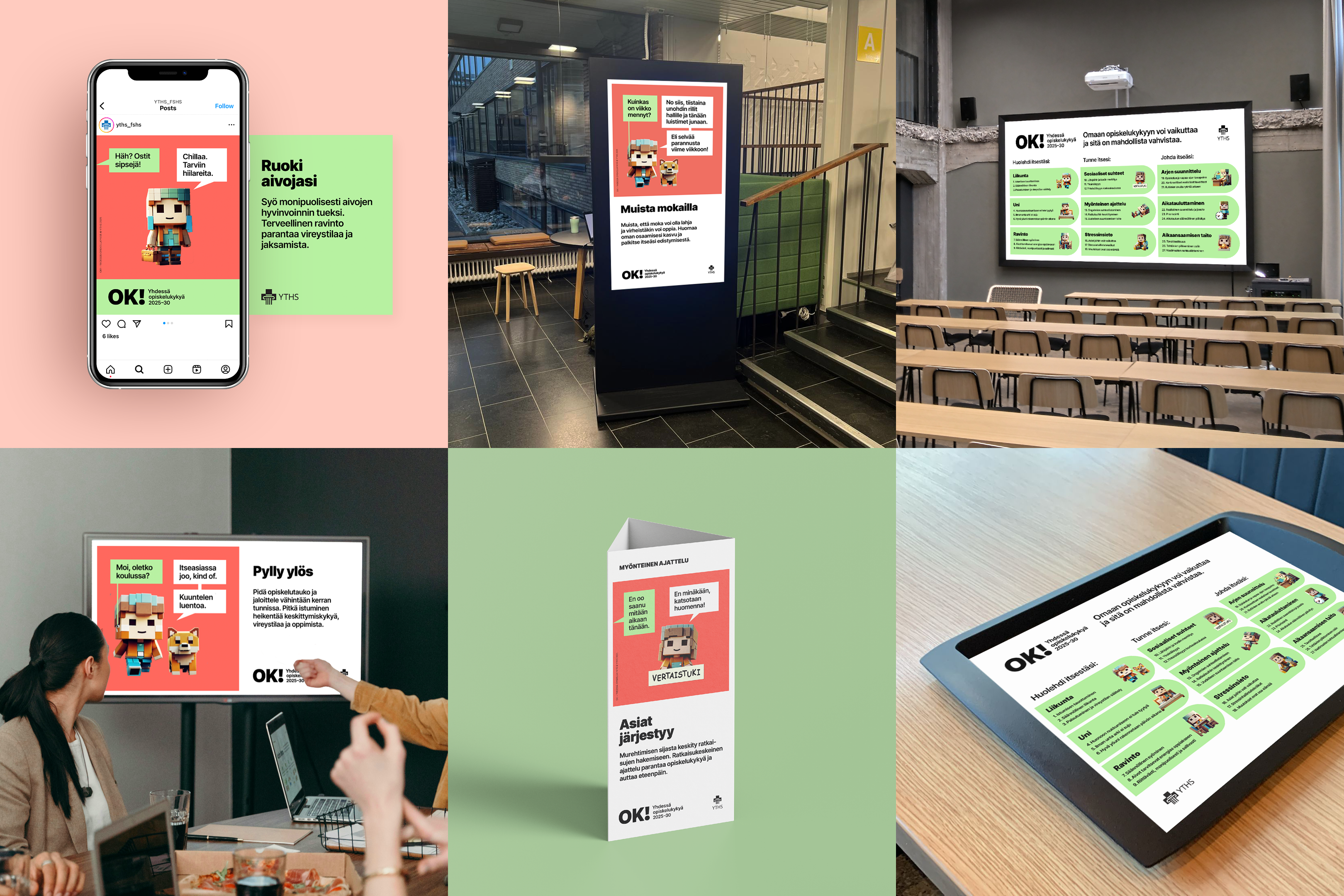OK! – Together Promoting Ability to Study

Ability to study today means ability to work tomorrow. There’s much you can do to improve your ability to study. The FSHS provides support to help you improve your ability to study and progress with your studies.
Look after Yourself
Students’ everyday life can be busy and challenging. Enjoyment is part of life, which means it’s important to take care of your own well-being. Looking after yourself isn’t rocket science, it’s all about small choices and routines on a daily basis. Think about your eating, sleeping and exercising habits.
Physical Activity
- Take a break from sitting. Sitting still for a long time with no breaks interferes with your concentration, energy level and learning ability.
- Exercise regularly. Regular exercise helps keep you fit so you can perform your daily activities with ease.
- Look after your recovery and energy levels. Exercising and taking breaks during the day improves energy levels and helps with both recovery and sleep. Physical activity promotes mental health and prevents stress and exhaustion.


Sleep
- Aim for good quality sleep. Getting good quality sleep isn’t always easy, but you don’t have to settle for poor sleep.
- Give your brain some rest. Studying is stressful for the brain, and your brain needs regular rest, even if you aren’t physically tired.
- Set yourself up during the day for a good night’s sleep. Choices you make throughout the day affect the way you sleep. You can improve your sleep quality by being aware of your daily rhythm – what you do and for how long you do it.
Nutrition
- Eat regularly. You’ll think better when you’re not hungry.
- Provide your brain with the energy needed to learn. Healthy eating improves your energy levels and helps you cope.
- Eat the right amounts, aim for a varied diet and eat in a relaxing atmosphere. A balanced diet boosts your energy levels, promotes good health and can be a stress-free part of your daily life.

Know Yourself
For a student it’s important to know yourself. It helps you identify your own strengths and things you want to improve. As you build your own identity, you’ll think about and reflect on your values, relationships, career and goals as you seek to live your life the way you want it to be.

Social relationships
- Support from your family, friends and fellow students helps you cope with life’s challenges. Everyone’s need for social relationships is different, and having social networks that work for you helps support your well-being.
- Feeling lonely may undermine your ability to study because it affects your mental resources and cognitive skills like concentration and problem solving. If you feel that loneliness is affecting your mental resources or your ability to study, seek help.
- Being part of a student community boosts study motivation, reduces loneliness and supports learning. The communal atmosphere at a higher education institution supports ability to study by strengthening well-being, motivation and the feeling of togetherness.
Positive Thinking
- Keep things in proportion and think positive. Having a positive attitude and keeping things in proportion improves resilience and helps support your ability to study.
- Concentrate on finding solutions. A solution-oriented approach boosts your ability to study and helps you move forward.
- Learn new perspectives. This way you’ll find new ways to meet your goals and promote your ability to study.


Stress Management
- Focus on things you can influence yourself. Strengthen your stress management skills by focusing on things you can do something about. This will boost your well-being and ability to study.
- Take control of stress. Stress arises when the challenges and demands on you exceed your available resources.
- Accept changes as part of life. This will help you adapt to new situations more flexibly and avoid unnecessary resistance or worrying when facing changes in life.
Be in Charge
Being your own leader is a skill that can be learnt. It includes setting clear and realistic goals, time management, self-discipline, ability to make decisions, knowing yourself, commitment, flexibility and taking care of your own well-being. You can develop your skills in self-leadership one step at a time.
Plan Your Daily Life
- Find a balance between studying and leisure time. This will promote recovery, prevent exhaustion and help you maintain motivation and concentration.
- Set concrete, realistic study goals for yourself. This way you’ll get better study results and improve your motivation.
- Use routines to create rhythm in your life. Regular routines help with time management and staying organised.


Schedule
- Plan realistically and prepare to be flexible. This will help you manage your work and help you to cope.
- Prioritise your tasks. Identify the most important ones and focus on them.
- Update your daily schedules regularly. This will help you lower your stress levels and stick to your goals.
Learn to Get Things Done
- Setting goals helps you stay on track with your studies and improves motivation.
- Break your tasks down into smaller pieces. Completing these smaller tasks will give you a sense of accomplishment.
- Stay positive and assess your progress. This way you’ll be able to make changes and identify the best ways to learn.

OK! Campaign Material for Higher Education Institutions
The OK! Campaign is a joint project between the FSHS and Finnish higher education institutions. It aims at improving students’ ability to study and study environments, at the same time supporting staff at higher education institutions in their work.
The FSHS has produced communication campaign material based on the FSHS’s Ability to study model for use by higher education institutions. The campaign aims at stimulating and fostering attitudes towards ability to study among students and staff working in higher education:
- I know the meaning and importance of ability to study.
- I take care of our students’/my ability to study so that our students/I can graduate.
- I have a clear understanding of the things that affect the ability to study.
The campaign material includes ready-to-use applications covering the different aspects of ability to study:
Higher education institutions can utilise the campaign themes and applications in their communications. The material can also be modified to fit in with each higher education institution’s own communications concerning ability to study.
Questions and information about making different versions of the material:
